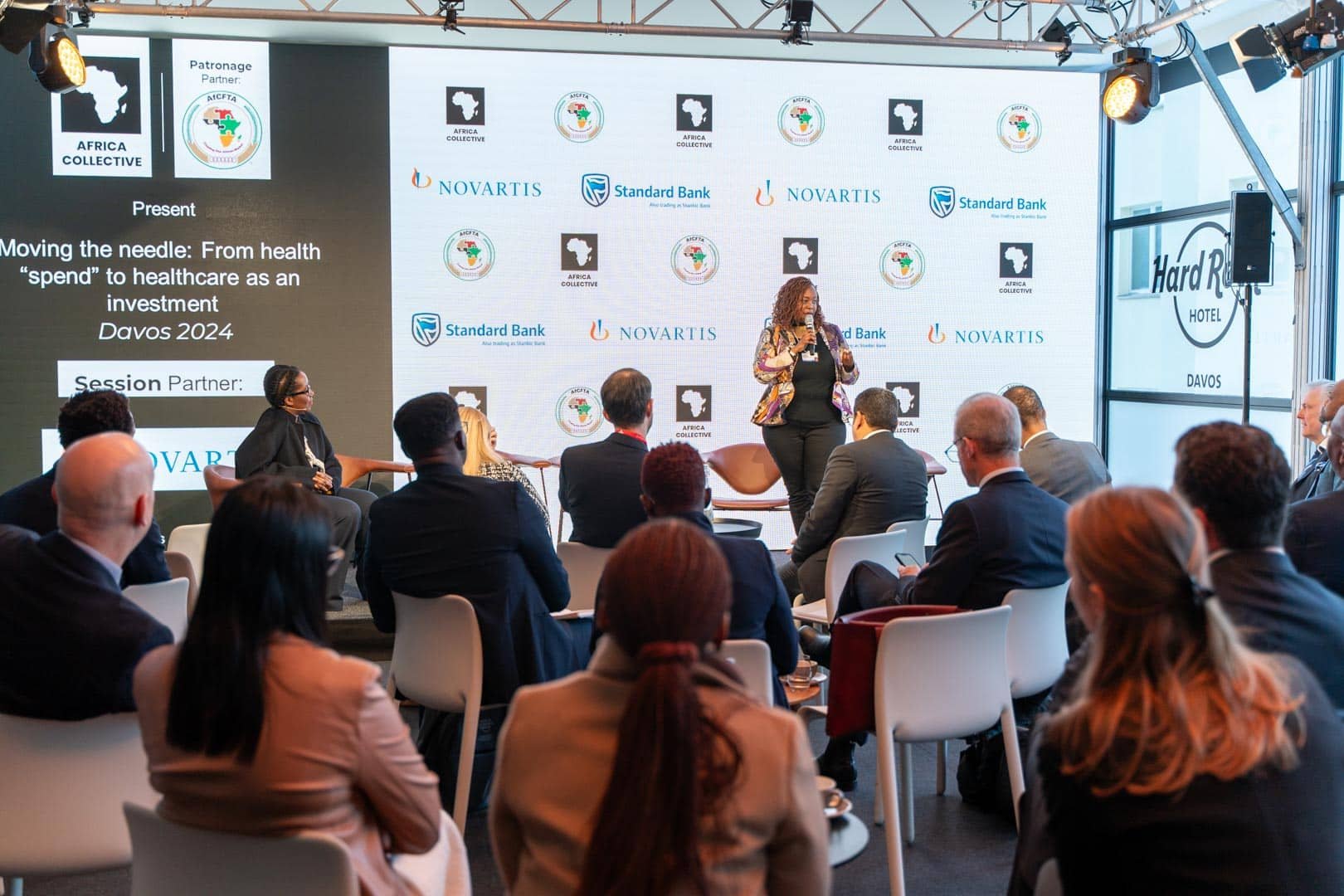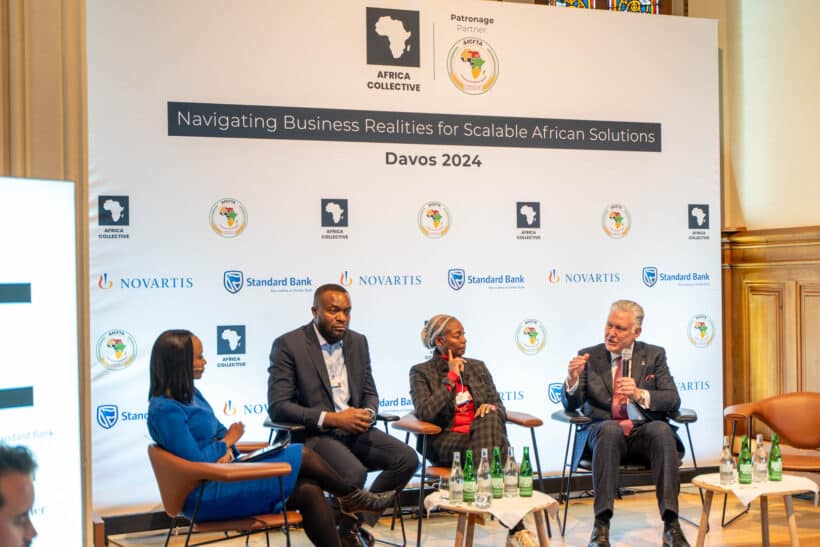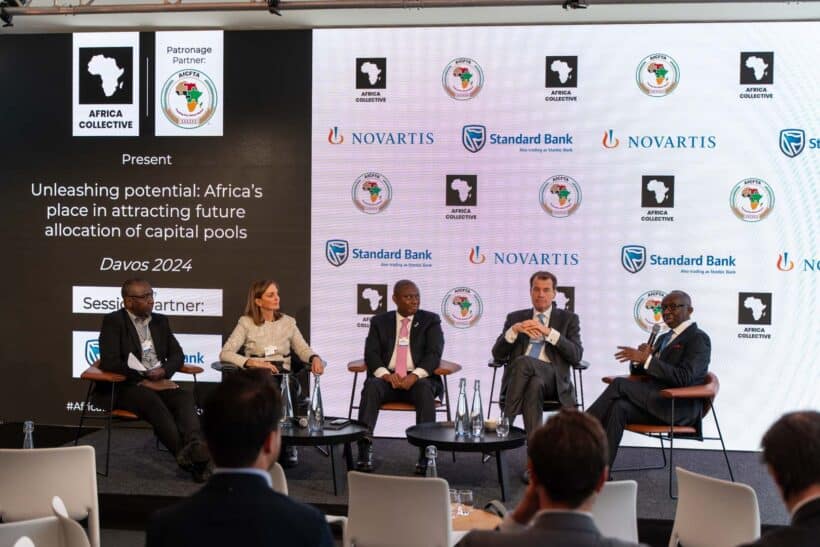
Africa Collective scales up 2024 Davos presence to convene international and pan-African private and public sector leaders.
31 January 2024 – Davos, Switzerland. Africa Collective, with the AfCFTA Secretariat as patronage partner, scaled up its Davos presence during the time of the World Economic Forum Annual Meeting between 15-19 January 2024, with the objective of providing a complementary platform to amplify and exchange on African topics at the gathering of world leaders. A key focus of the Africa Collective week was to discuss the investment climate on the African continent as well as how to leverage opportunities and resolve existing challenges in doing business, all in the context of accelerating the implementation of the AfCFTA.
The weeklong program included several high-level sessions, each bringing together between 50-80 key decision makers from the public and private sectors. The week commenced with a welcome luncheon entitled “Paving the Way: Commodity-led Industrialization on the African Continent” including panel insights from Denys Denya, Executive Vice President, Afreximbank; Sanjeev Gupta, Executive Director Financial Services, Africa Finance Corporation; and Eugene Mayne, CEO, Tristar Group. This was followed by a breakfast roundtable in partnership with Novartis, focused on the topic “Moving the needle: From health ‘spend’ to healthcare as an investment” with interventions by H.E. Wamkele Mene, Secretary General, AfCFTA Secretariat; H.E. Helene Budliger Artieda, State Secretary of the Swiss State Secretariat of Economic Affairs (SECO); Lutz Hegemann, President Global Health & Sustainability, Novartis; Angela Gichaga, Founder & President, Financing Alliance for Health; H.E. Christian Frutiger, Vice-director, Head of the Thematic Cooperation Division, Swiss Agency for Development and Cooperation. A digital & art showcase networking cocktail then brought together global & African leaders with talented African artists and high potential startups.

In partnership with Standard Bank, the final breakfast roundtable examined the topic “’Unleashing potential: Africa’s place in attracting future allocation of capital pools”, featuring contributions by Sim Tshabalala, CEO, Standard Bank Group; Leila Fourie, Group CEO, Johannesburg Stock Exchange; Jürgen Rigterink, First Vice President, European Bank for Reconstruction & Development (EBRD); and Dr. Armstrong Takang, CEO, Ministry of Finance Incorporated (Nigeria).
The week concluded with the customary Africa Collective closing & outlook luncheon. Under the theme “Navigating Business Realities for Scalable African Solutions”, four panelists – H.E. Bosun Tijani, Minister of Communications, Innovation & Digital Economy of the Federal Republic of Nigeria; H.E. Wamkele Mene, Secretary General, AfCFTA Secretariat; Nonkululeko Nyembezi, Chairman, Standard Bank Group; and Lutz Hegemann, President of Global Health & Sustainability, Novartis – discussed how the public and private sectors can concretely unlock opportunities on the continent. Interventions from invited private sector leaders provided concrete examples of corporate initiatives and investments throughout the continent.

Key learnings from the week center on how the private sector plays a key role in accelerating the implementation of the AfCFTA in a sustainable way. Across the diverse industries represented in the program, the following outcomes stood out from the conversations held throughout the week:
- Collaboration and alignment between the public and private sectors are crucial for creating initiatives that positively impact the trajectory of the African continent.
- Strong institutions and regulatory harmonization on the African continent ensure predictability and create an enabling environment for doing business. This nurtures trust with the business and investor communities.
- While the AfCFTA provides an enabling environment for doing business, the private sector needs to leverage opportunities the free trade agreement has created and actively contribute to its implementation and development.
- Physical and Digital Infrastructure are critical to driving industrialization on the continent and to leapfrog toward new forms of industrialization, services and business.
- Strengthening value chains across different sectors requires a mix of efforts including but not limited to: investment in infrastructure; early stage investment in projects that support the strengthening of value chains; increasing sustainable power generation, transmission and distribution to build industrial capacity; skills development and training; and capacity building.
- The private sector plays a role in the empowerment and wellbeing of communities through initiatives, job creation and providing access to healthcare and basic services.
These discussions were shaped by the following Africa Collective corporate partners: Lead Partners Novartis and Standard Bank Group; Corporate Partners Old Mutual Limited, Ringier AG and Tristar Group; Supporting Partners OmniBiz and Fin.
Lead Media Partner Business Insider Africa, CNBC Africa and African Business provided coverage throughout the week with CNBC Africa and African Business moderating three separate sessions of the agenda.
In the 12-month leadup to Africa Collective Davos 2025, the Africa Collective will be present at key events on the African continent, as it continues to grow its network of actionable exchange and collaboration on African opportunities.

